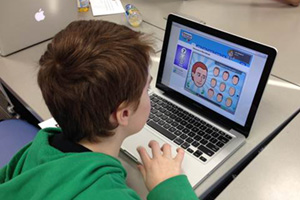UOIT hosts March Break digital literacy camp
April 21, 2014

Nine local elementary students were introduced to the University of Ontario Institute of Technology’s (UOIT) high-tech learning environment during a four-day educational camp recently hosted by the Faculty of Education (FEd) over their March Break. The camp theme centred on gaming, gaming culture and coding and was designed to help prepare the students for Education Quality and Accountability Office (EQAO) testing.
Dr. Janette Hughes, Assistant Dean, FEd, along with her research assistant Laura Morrison, several UOIT Primary/Junior teacher candidates and Brock Dubbels, a gaming and coding expert, led the students through a variety of digitally-infused literacy and numeracy activities to help them prepare for the upcoming provincial testing.
The camp was held in UOIT’s Digital Literacies Research and Development Lab. There students learned basic coding skills, which were built on throughout the week and culminated in simple student-generated games.
“Learning to code is an important skill in our digital age because it enables students to learn another language and to think computationally,” explained Dr. Hughes. “Not only is it cool for kids to be able to write a sequence of code that will make a character move on screen, but it also allows them to ‘look under the hood’ and get a better understanding of how things work around them.”
“A huge thank you to everyone who worked hard to make the digital literacy camp a success,” said Dr. Suzanne de Castell, Dean, FEd. “The activities the students engaged in were fun, dynamic and relevant to their lives, both within the classroom walls and beyond.”